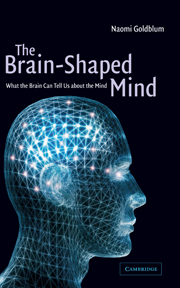Book contents
- Frontmatter
- Contents
- Preface
- Figure permissions and acknowledgments
- 1 Introduction
- 2 What the brain cannot tell us about the mind
- 3 How neurons form networks
- 4 Theories and models of how the mind functions
- 5 What are connectionist networks?
- 6 How our networks learn
- 7 Connecting the networks: how different things are related
- 8 Evidence for connectionist models
- 9 Two different types of memory
- 10 Coping with disaster
- 11 Practical implications
- 12 Criticism of connectionist theory
- Annotated references and suggested readings
- Index
2 - What the brain cannot tell us about the mind
Published online by Cambridge University Press: 02 December 2009
- Frontmatter
- Contents
- Preface
- Figure permissions and acknowledgments
- 1 Introduction
- 2 What the brain cannot tell us about the mind
- 3 How neurons form networks
- 4 Theories and models of how the mind functions
- 5 What are connectionist networks?
- 6 How our networks learn
- 7 Connecting the networks: how different things are related
- 8 Evidence for connectionist models
- 9 Two different types of memory
- 10 Coping with disaster
- 11 Practical implications
- 12 Criticism of connectionist theory
- Annotated references and suggested readings
- Index
Summary
Why should we base our theories about the mind on our knowledge of how the brain functions? Why shouldn't we study the mind as philosophers and scientists did for centuries, by introspecting to find out how we ourselves think and then asking other people questions to find out how they think? Or if we want to be more scientific, and we can figure out how to make a computer do what human beings do, why not assume that the way the computer does it is the way humans do it too?
One reason is that there is a very great difference between our ability to know what we are thinking and our ability to understand how this thinking takes place. We are aware mainly of the contents of our thoughts, because this is the knowledge we need in order to be able to function. I need to know that the object I am looking at is an apple in order to know that I should pick it and eat it rather than the leaf next to it. I do not need to know how I recognize it as an apple in order to eat it and be nourished. Our consciousness has therefore evolved to be aware of what we are thinking, but not of how we go from one thought to another, or how we go from a perception to a thought, or from a thought to an action.
But our minds at some point, perhaps at the time of the Greek philosophers, began to consider the way they themselves work. As human beings, we cannot be satisfied with just knowing facts about the world “outside” ourselves.
- Type
- Chapter
- Information
- The Brain-Shaped MindWhat the Brain Can Tell Us About the Mind, pp. 12 - 20Publisher: Cambridge University PressPrint publication year: 2001



